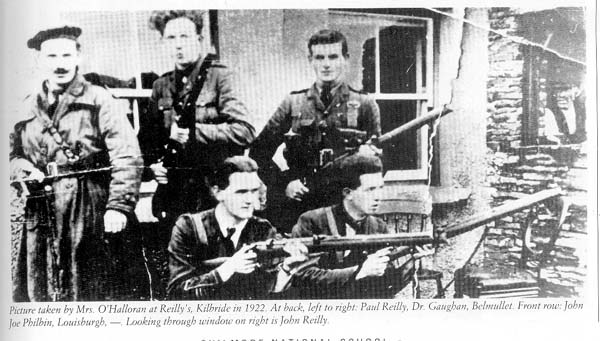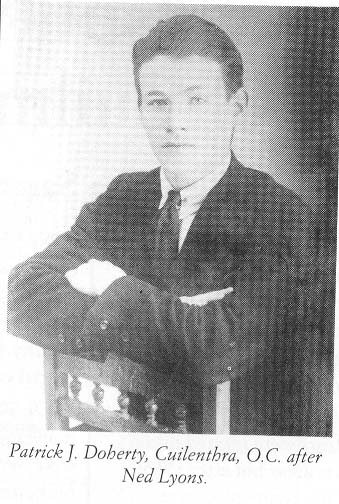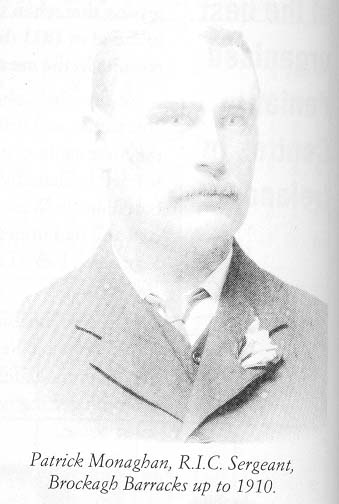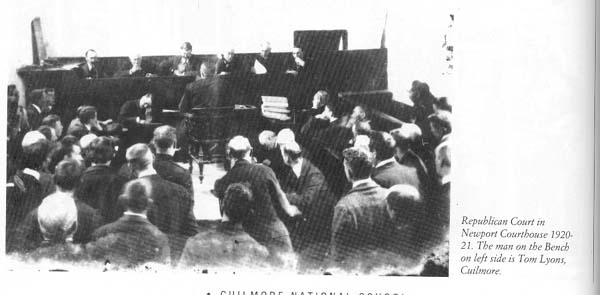
IN the early years of the Century the Fenian movement was very active and Kilmeena and Newport were named as the best organised Fenian Centres in Ireland so it was not sur- prising that when the Irish Volunteers founded in 1913 they found many willing recruits in the area.
At first the Volunteers were formed into companies and brigade areas but after 1916 they reorganised and the companies were formed in Battalions and there were four battalions in West Mayo. Newport was number two and had under its control: Newport, Kilmeena, Fahy, Glenhest, Tiernaur, Achill and Ballycroy.
The first meeting of the Battalion unanimously elected Ned Lyons of Cuilmore as O.C. and he immediately set about organising the area and getting ready for the fight they knew must come.
Ned Lyons was a blacksmith by trade and continued to work in his smithy in Chapel Street. Ned was under constant surveillance by the R.I.C. and as attacks on police started throughout the country I.R.A. officers were ordered to take special care and rarely slept in their own homes.
On 24th October 1920, Ned Lyons stayed at home in Cuilmore as the house he usually slept in were having the stations and in the early morning his home was surrounded by police and military and he was taken prisoner.
He was taken to the Military Barracks at Westport Quay where he was questioned and beaten for many days. On November 1st he was seen being taken in an open lorry dressed only in his shirt and trousers to Galway Jail.
In Galway, a special squad was brought in to deal with him and he was subjected to the most brutal torture. Prisoners in the jail sent out word that his screams kept them awake at night. As the torture continued he never broke and continued his hunger strike and never broke his silence. Then there was silence and all enquiries from his brothers and friends went unanswered.

The War of Independence continued until the truce in July 1921 and still no word of what happened to Ned Lyons, but then word came that he was a patient in Dundrum Asylum -. totally insane.
Michael Kilroy, a very close friend visited him there and records that he bore all the marks of the most terrible torture. He never spoke and gave no sign of recognition but he still maintained his hunger strike. Every effort was made to have him removed for medical treatment but was refused. He died, mercifully, on 24th October 1924 exactly four years since his arrest. He was 28 years of age.
While Ned Lyons was suffering in Dundrum his home was raided one night in 1921 by a force of police and Black and Tans led by the notorious District Inspector Judge. They savagely beat up his brother Tom Lyons leaving him for dead in the house. After they left, his sister, who escaped through a window, tried to revive him and would have failed but for the timely arrival of her kind neighbours Bina and Margaret Geraghty. They carried him to a place of safety but he never recovered from his injuries and died in 1925 a year after Ned.

A monument in honour of Ned Lyons was erected by his comrades on Meddlicott Street, Newport.
After Tom's beatings his brother Pat left his teaching post in Dublin and returned home to help. He was arrested by Free State Forces on the evening of the Brockagh Ambush and taken to Mountjoy Jail where with other republican prisoners he took part in the great Mountjoy Hunger Strike in 1932. It lasted for forty-one days and he never recovered from its effects, he died in 1928 not yet 30 years of age.

